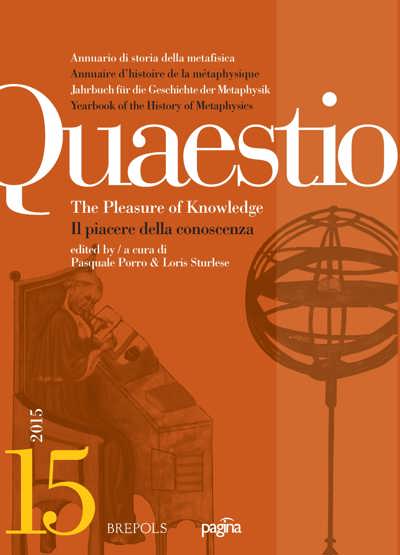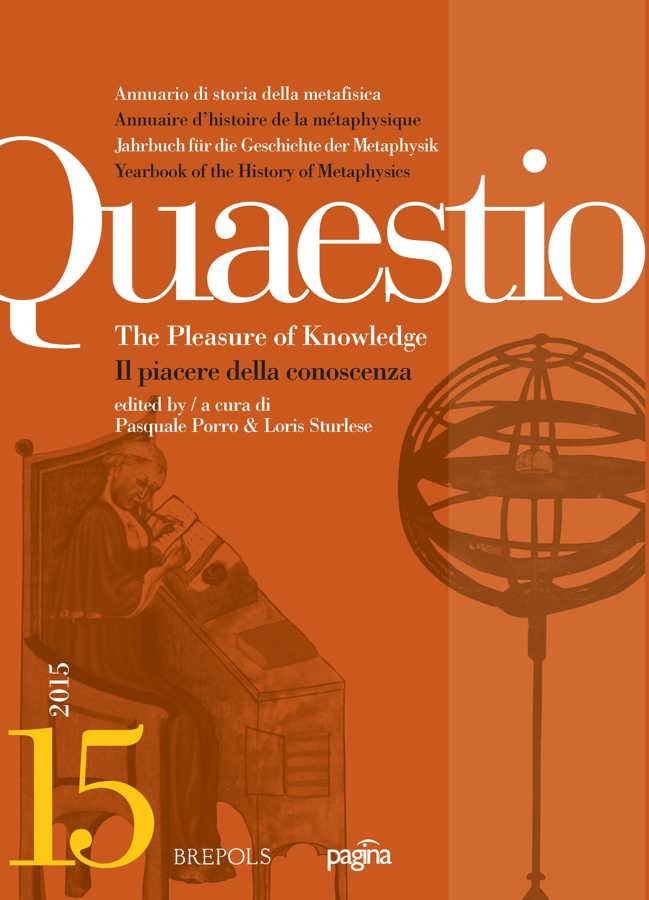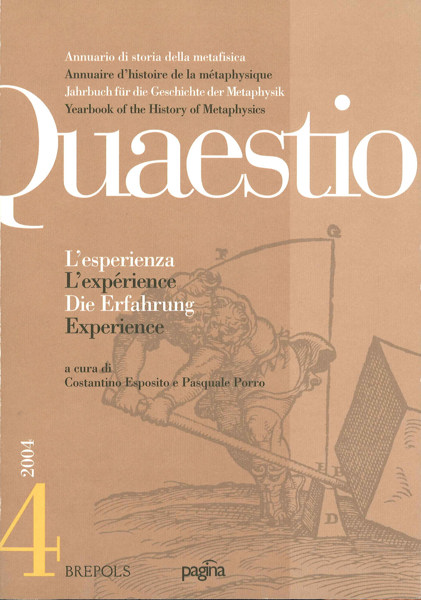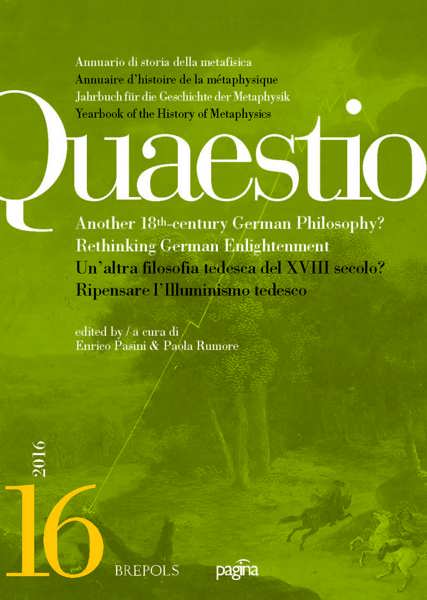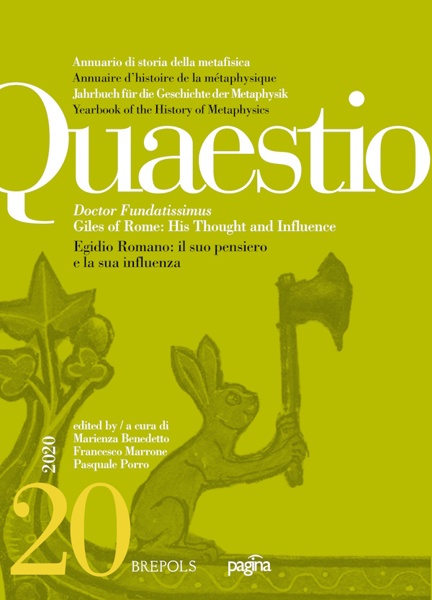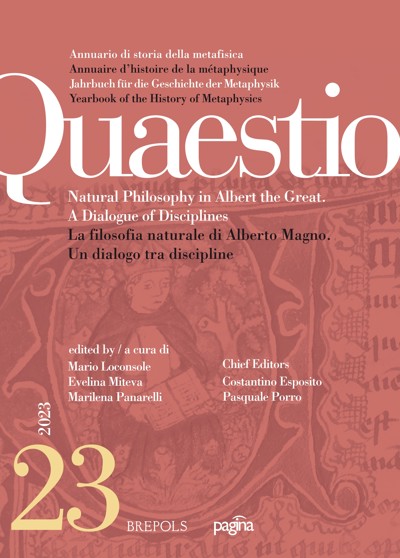
QUAESTIO 15 (2015)
The Pleasure of Knowledge
- Pages: 875 p.
- Size:170 x 240 mm
- Language(s):English, Italian, French
- Publication Year:2016
- € 82,00 EXCL. VAT RETAIL PRICE
- ISBN: 978-2-503-56596-5
- Paperback
- Available
- E-journal
- Available
Pasquale Porro / loris sturlese
Premessa
Plenary sessions
THOMAS RICKLIN
« Filosofia non è altro che amistanza a sapienza »
NADJA GERMANN
Logic as the Path to Happiness: Al-Fa-ra-b-ı and the Divisions of the Sciences
DAVID LUSCOMBE
Otto of Freising and Historical Knowledge
IRENE CAIAZZO
Nature et découverte de la nature au XIIe siècle : nouvelles perspectives
LUISA VALENTE
Happiness, Contemplative Life, and the tria genera hominum in Twelfth-Century Philosophy: Peter Abelard and John of Salisbury
MANUEL LÁZARO PULIDO
¡Sapere gaude! La fuente bonaventuriana de la literatura mística del saber
CATHERINE KÖNIG-PRALONG
Omnes homines natura scire desiderant. Anthropologie philosophique et distinction sociale
ROBERTO HOFMEISTER PICH
Infinite Creator
ALESSANDRA BECCARISI
Ex Germano in rebus divinis. „Spekulative" und „deutsche" Mystik im Kontext
The Byzantine and Georgian World
SERGEI MARIEV
Theoretical Eudaimonia in Michael of Ephesus
STAMATIOS GEROGIORGAKIS
Taking Pleasure in Knowing according to the Greek Commentaries of the Nicomachean Ethics after the 11th Century
TENGIZ IREMADZE
Die Erkennende Seele des Menschen und ihre Funktion im Porklos-Kommentar von Joane Petrizi
GEORGE ARABATZIS
Daniel Furlanus on Michael of Ephesus and the Pleasure of Biological Knowledge
The Arabic-Islamic World
ARFA MENSIA MOKDAD
La connaissance vraie comme cause possible de souffrance perpétuelle chez al-Fa-ra-b-ı
MIKLÓS MARÓTH
Delight of Knowledge in al-Ma-ward-ı’s View
FRANCISCO O’REILLY
La metafísica como perfección del deseo humano. Comentario a Philosophia Prima (IX, 7) del Avicenna Latinus
AMARI YASSINE
Analysis of Pleasure in Ibn S-ına-
TERENCE J. KLEVEN
Ibn Ba-gˇ gˇ a’s Commentaries on al-Fa-ra-b-ı’s Letter and The Five Aphorisms
FRANCESCA FORTE
Averroes’s Aesthetics. The Pleasure of Philosophy and the Pleasure of Poetry
The Jewish World
EDWARD C. HALPER
Maimonides on the Scope of Divine and Human Self-Knowledge
YEHUDA HALPER
Abraham Bibago on Intellectual Conjunction and Human Happiness. Faith and Metaphysics according to a 15th Century Jewish Averroist
The Latin-Christian World from Boethius to the 12th Century
TAKI SUTO
From Analysis of Words to Metaphysical Appreciation of the World. The Platonism of Boethius
RENATO DE FILIPPIS
Die Freude (an) der Rhetorik in Anselm von Besates Rhetorimachia
THOMAS HANKE
Lust an der rectitudo. Erkenntnis, praktische Vernunft und Emotionen bei Anselm von Canterbury
HWANGBO CHUNG-MI
Zur Teilhabe der Empfindung der Seele an der Gotteserkenntnis in Anselms Monologion und Proslogion
GUY HAMELIN
Volonté et habitus chez Pierre Abélard: un double héritage
GIACINTA SPINOSA
Plaisir de la connaissance comme émotion intellectuelle
chez Hugues de Saint-Victor
HIDEKI NAKAMURA
Spiritualium gaudiorum plenitudo
in der Erkenntnislehre Richards von St. Viktor
GEORGINA RABASSÓ
In caelesti gaudio. Hildegard of Bingen’s Auditory Contemplation of the Universe
BRIGITTE SAOUMA
L’ignorance des cathares d’après Izarn
AAFKE M. I. VAN OPPENRAAY
Michael Scot’s Translation of Aristotle’s Books on Animals and the Pleasures of Knowledge
KATRIN FISCHER
Avicenna’s ex-uno-Principle in William of Auvergne’s De trinitate
ISABELLE MOULIN
Les deux sources du bonheur humain : contemplation intellective et vision de Dieu. Avicenne, Albert le Grand
EILEEN C. SWEENEY
Roger Bacon and Albert the Great on Aristotle’s Notion of Science
HENRYK ANZULEWICZ
Albertus Magnus über die felicitas contemplativa als die Erfüllung eines natürlichen Strebens nach Wissen
MARIA BURGER
Gotteserkenntnis im Aufstieg bei Albertus Magnus
GRAZIANO PERILLO
La contemplazione, principale caratteristica dell’Evangelista Giovanni secondo Alberto Magno
ANDREA COLLI
From sapientia honorabilissima to nobilitas animae.
A Note on the Concept of "Nobility" in Ulrich of Strasbourg’s De summo bono
JÖRN MÜLLER
Memory as an Internal Sense: Avicenna and the Reception of His Psychology by Thomas Aquinas
GERALD CRESTA
Bonaventure: intellectual contemplation, sapiential contemplation and beatitudo
TOMÁS MACHULA
Per intellectum ad beatitudinem. Thomas Aquinas and Bonaventure on the Role of Prudence in Human Life
ALESSANDRO GHISALBERTI
Il compimento della felicità in Tommaso d’Aquino
DANIEL DE HAAN
Delectatio, Gaudium, Fruitio. Three Kinds of Pleasure for Three Kinds of Knowledge in Thomas Aquinas
PASCALE BERMON
Plaisir et coordination sensorielle des animaux chez Aristote et Thomas d’Aquin
OLEG. E. DUSHIN
Morality as Knowledge in Ethical Theory of Thomas Aquinas
CARLOS ARTHUR RIBEIRO DO NASCIMENTO
Renversant la hiérarchie
A. IVANOV
Thomas Aquinas in Reference to the Beautiful: Definitions and Theory
ERCOLE ERCULEI
The Soul’s Misery in the Fire according to Thomas Aquinas and Siger of Brabant
SILVIA NEGRI
Veritatem humiliter investigare. Sul ruolo dell’umiltà in Enrico di Gand
GIULIA SOSSI
Il De laudibus divinae sapientiae di Egidio Romano e la possibilità per l’uomo di conoscere Dio
DELPHINE CARRON-FAIVRE
La République romaine comme modèle de la felicitas civilis chez Ptolémée de Lucques (v. 1240-1327)
HANS KRAML
Cognitio substantiarum separatarum: Genitivus subiectivus oder Genitivus obiectivus?
The Latin Christian World from Boethius in the 13th Century
MARIA MANUELA BRITO-MARTINS
La Béatitude et le désir chez Duns Scot: beatitudo est frui summo bono
THOMAS MARSCHLER
Frui essentia non fruendo persona. Die Lehre des Johannes Duns Scotus über die Trennbarkeit von Wesenheit und Personen in der Gottesschau und ihre Kritik bei Wilhelm von Ockham
FRANCESCO FIORENTINO
The Desire for Knowledge in Early Scotist Debates: William of Alnwick and John of Reading
JOHN T. SLOTEMAKER
Walter Chatton and Adam Wodeham on Divine Simplicity and Trinitarian Relations
VESA HIRVONEN
William Ockham on the psychology of Christ
RODRIGO GUERIZOLI
Pleasure and Knowledge in John Buridan’s Solution to the Debate over the Extension of the Aristotelian Supreme Good
AMOS CORBINI
Fruitio et beatitudo entre volonté et intellect selon Pierre de Ceffons
CAL LEDSHAM
Pleasure in Philosophy and the Pretext of Theology
The Latin Christian World from the 15th Century to Early Modern Scholasticism
UELI ZAHND
Utilitas als anti-spekulatives Motiv. Zur Rezeption eines Gerson’schen Anliegens im ausgehenden Mittelalter
ALESSANDRA SACCON
Die natürliche Gotteserkenntnis in den Schriften der Kölner Albertisten des 15. Jahrhunderts
MARIO MELIADÒ
De religiosa solitudine. Eimerico de Campo e una controversia tardo-medievale sulla clausura
MANDRELLA I.
Gaudium intellectuale: Die intellektuelle Freude bei Nicolaus Cusanus
MA SOCORRO FÉRNANDEZ-GARCÍA
El deseo intelectual como constitutivo formal de la mente en Nicolás de Cusa
FRANCESCO MARRONE
Le désir de connaître et la démonstration de la primauté de la philosophie première chez Dominique de Flandre
CHRISTIAN TROTTMANN
Science, sagesse et jouissance, d’Augustin à Charles de Bovelles
MARIA DA CONCEIÇÃO CAMPS
"The Pleasures of seeing" according to Manuel de Gois’ Coimbra Jesuit Commentary on De Anima (1598)
LIDIA LANZA
La beatitudo nei commenti cinquecentini di Salamanca alla Summa Theologiae (Ia-IIae, q. 3, art. 1-2)
ANGEL PONCELA-GONZÁLEZ
La teoría islámica del conocimiento profético y la concepción suareciana del intelecto
ALFREDO CULLETON
La economia y el precio justo en la segunda escolástica
